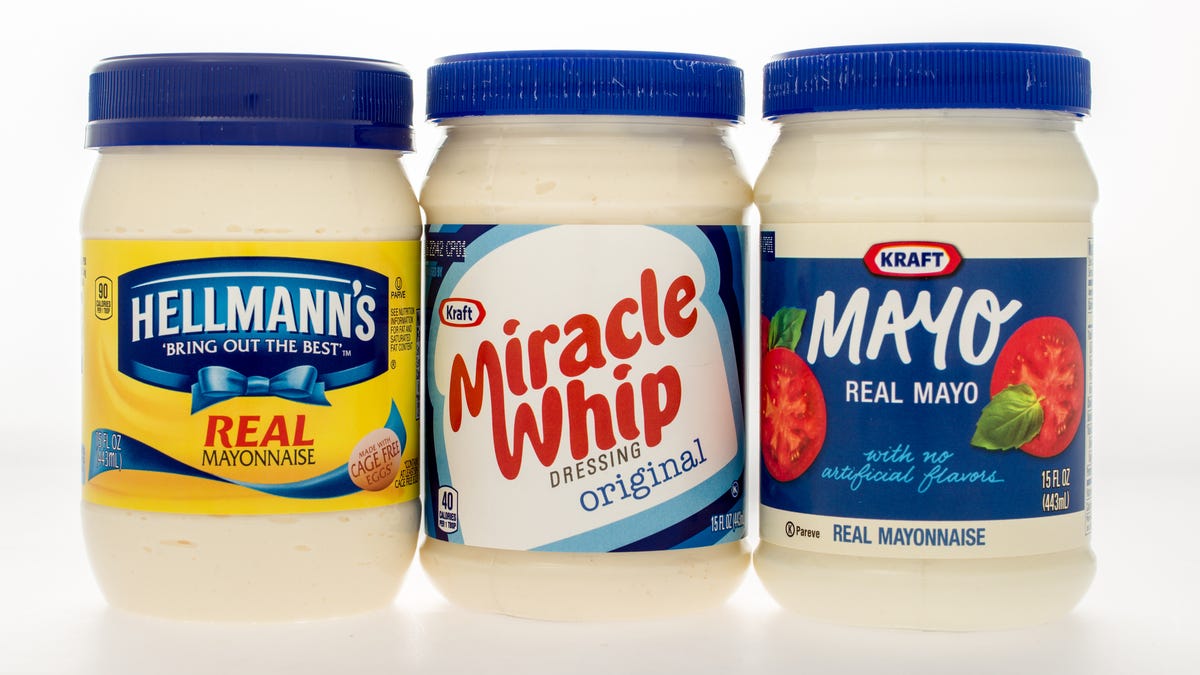 Why You Can Trust CNET
Why You Can Trust CNET Pantry Staples and Other Foods That Spoil Faster Than You'd Think
Olive oil and brown rice are just two of the foods that you should keep an eye on.

Et tu, mayo?
Some foods seem as if they'll last forever, or even get better with age. I mean, what can happen to olive oil? Brown rice sure seems hearty, too. Unfortunately, not all ingredients that appear shelf-stable actually are. To avoid eating spoiled food, it's good to know which foods need regular date checks.
This guide to storing groceries in the fridge so they last longer will help. Below are five foods that spoil faster than you'd think -- essential information so you can predict when it's time to chuck them and pony up for a new jar, bag or bottle. If you've got some ingredients you need to use before they go, try these nine cooking hacks that work.
Olive oil
Old olive oil won't hurt you, but it will lose a whole lot of its flavor profile.
Oil seems like something that should last forever, right? You might even think olive oil gets better with age, but it doesn't. Quite the opposite. While olive oil has a fairly long shelf life when sealed -- about 12 to 18 months -- it starts to lose its oomph as soon as it's bottled and especially once it's opened. While it shouldn't pose a health risk, over time, olive oil will be rendered virtually tasteless or take on a funk that you definitely won't want drizzled on your barramundi.
This is especially good to know if you have an expensive bottle of EVOO that you've been trying to use sparingly. You're better off going for it while its full flavor profile is intact, within 60 days of cracking the seal. Considering that fresh olive oil is good olive oil, you'll also want to check the bottle or harvest date before you buy since it loses some of its flavor even before opening.
Brown rice
Thanks to a higher oil content than its white counterpart, uncooked brown rice lasts for just three or four months in the pantry.
Brown rice is another pantry mainstay that appears shelf-stable but should be used within a relatively short period. While white rice can last years if stored in an airtight container, brown rice lasts only about three or four months before it starts to turn. This is mostly due to brown rice's higher oil content.
Cooked rice, white or brown, has an even shorter life. If left unrefrigerated for even 90 minutes, cooked rice poses a real risk of food poisoning.
Mayonnaise
Mayo may seem like something you can keep in your fridge for years, but it's really only good for about two months.
Mayo has a healthy dose of vinegar, so you might think it will be good for a while. Not the case. The egg in mayonnaise makes it prone to spoilage, and most mayo should be used within about two months of opening. It's also good in the pantry unopened for only about three or four months.
The same goes for most salad dressings: about two or three months in the fridge after opening. While the vinegar helps keep them in good shape for a while, other ingredients aren't as resistant to the ravages of time.
Spices
Spices that are past their prime won't hurt you, but they won't help much, either.
While spices don't go bad, per se, they become pretty much useless after a certain point, losing a lot of their flavor even when stored in those little airtight jars. Try to avoid buying large bottles of spices, and be selective about what you throw in the cart. It's one of the reasons I love high-quality spice mixes, which I find myself going through more quickly than the odd bottle of cardamom or clove. (You can also grow certain pricey spices, including saffron, at home.)
Wine
Red wine can be aged for decades when stored properly. The same can't be said for most whites.
I know, I know, wine gets better with age. That's true, but that mostly applies to red wine, and all wine has to be stored carefully or it will turn into something you don't want to drink. I discovered this the hard way having been gifted a case one holiday. I confidently stacked the bottles on a wine rack in my very not temperature-controlled living room. When I uncorked one less than a year later, the damage had been done.
While some varietals can be aged, most white wines should be consumed within one to two years. To last even that long, bottles of white wine should be stored away from light and at a temperature above 40 and below 50 degrees Fahrenheit. To keep red wine from turning into red wine vinegar, cool and dark is key. Red wine should be stored away from direct light somewhere with a temperature between 50 and 59 degrees F.
To check similar information for other foods, the Food and Drug Administration's FoodKeeper App has a suggested list of storage times and protocols for just about anything you can eat or drink.

